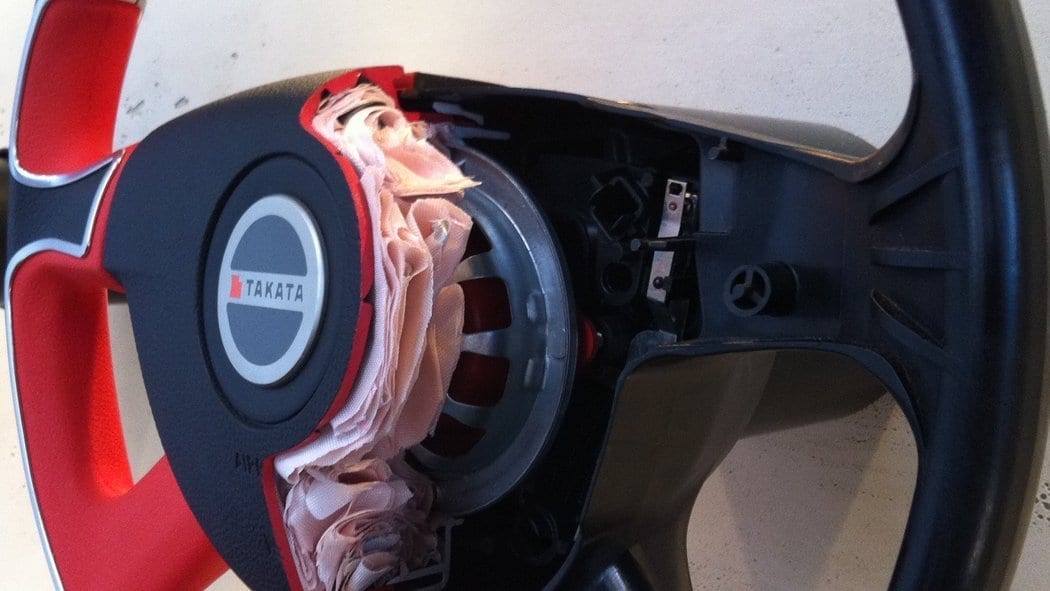Takata, the beleaguered airbag company, got hit with a trifecta of bad news this month: the 12th U.S. airbag-related fatality was announced, the reorganization bankruptcy continues with a Special Master managing restitution payments, and yet another 2.7 million airbags were recalled. The problems keep piling up faster than the Japanese auto supplier can deal with them.
Takata, the beleaguered airbag company, got hit with a trifecta of bad news this month: the 12th U.S. airbag-related fatality was announced, the reorganization bankruptcy continues with a Special Master managing restitution payments, and yet another 2.7 million airbags were recalled. The problems keep piling up faster than the Japanese auto supplier can deal with them.
The twelfth fatality incident happened in Hialeah, Florida on June 18, 2016 [editor’s note: the man – who was not the vehicle’s owner – was only recently identified as the 12th fatality despite the incident being over a year ago.] The man involved was working on a 2001 Honda Accord that was running during repairs; he was inside the vehicle.
Honda issued a statement on July 10 confirming the cause of death as the explosion of the airbag inflator. However, it is not known whether the airbag inflator was the sole cause of death. Reports have it that the man was conducting “an unspecified repair with a hammer” when the inflator exploded. He suffered serious injuries and died the next day. This brings the worldwide fatality count to seventeen.
Honda’s statement linked this latest fatality to Takata’s “Alpha” airbag inflators, a type used in two Acura and five Honda models made between 2001 and 2003. The “Alphas” were known to have a higher rupture risk. Honda recalled the 2001 Accord in the late 1990s and began a safety education project to warn drivers about the inflators in this particular model.
According to Honda, “Twelve mailed recall notices were sent over the course of nearly seven years to registered owners of this vehicle prior to the June 2016 incident. Our records indicate that the recall repair was never completed on this vehicle.”
The “Special Master” of restitution in the Takata bankruptcy was also announced last week. The job goes to Professor Eric Green of Harvard University. Prof. Green replaces Robert Mueller, the first chosen “Special Master,” after Mr. Mueller was chosen to head up the investigation into Russian meddling with the 2016 presidential election.

Professor Green is now tasked with distributing almost $1 billion dollars set aside for individuals and companies hurt by the faulty airbags. A court notice was issued and is reprinted below:
“Professor Green has been the mediator in many major high-profile complex cases, including United States v. Microsoft, the Enron civil litigation, the LCD, CRT, polyurethane, auto-parts, payment card and other complex anti-trust cases. He has served as mediator, arbitrator, or Special Master in many mass tort cases including asbestos, PCBs, toxic environmental and occupational exposures, pharmaceutical products liability cases, and financial frauds. Many of these cases involved the fair apportionment of limited settlement funds among eligible claimants, similar to the task in this case. Takata will pay $25 million in fines to the government; $125 million will go into a fund to compensate individuals hurt or killed by defective Takata airbags, and $850 million will go to a fund to repay auto companies for costly airbag recalls.”
Takata filed for bankruptcy protection on June 25, 2017.
Another 2.7 million airbags have been recalled after Takata discovered yet another danger during testing. The company advised the National Highway Traffic Safety Administration (NHTSA) on July 10 that certain inflators may explode, similarly to the ones behind the original recall. These newly identified inflators use calcium sulfate to keep them dry.
Moisture and temperature fluctuations are the enemy of all of the defective devices due to the effect they have on the ammonium nitrate propellant. Several different desiccants have been used over the years, including calcium sulfate.
According to Takata, the newly recalled inflators were used in Nissan, Mazda, and Ford vehicles sold in the U.S. and built between 2005 and 2012. The affected inflators are on the driver’s side only. To date, Takata has no knowledge of explosions or injuries connected to the newest recall. The company issued a statement to the effect that it was recalling the calcium sulfate inflators “out of an abundance of caution.” It is also investigating later generations of the affected inflators.
As one can imagine, this news brought a fresh onslaught of criticism against Takata, one of the strongest being from Senator Bill Nelson (D-FL).
Sen. Nelson said, “This recall now raises serious questions about the threat posed by all of Takata’s ammonium-nitrate-based airbags. If even more are found to be defective, it will take us from the biggest recall ever to something that could become mind-boggling.”
The senator asked regulators to hurry to determine “whether all remaining Takata airbag inflators are safe.”
The company hopes that the sales of its assets during bankruptcy proceedings will fund the remaining recall repairs.


Join the conversation!